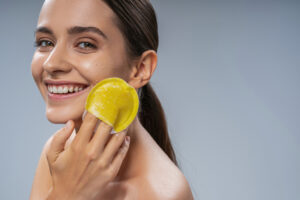Do You Exfoliate? Best Exfoliators For YOUR Skin Type
There’s a fine line between smooth and rubbed raw. Millions get it wrong every day. Never fear, we’ve got your guidelines here.

Close up portrait of a merry young woman performing an exfoliation procedure with a facial sponge
We have exfoliating gloves, cleansers, and scrubs…but are they all created equal? Experts say, No. Exfoliating is the process of removing dead skin cells from the surface of your skin, a natural build-up that occurs as our skin tries to make way for new cells. But according to the American Academy of Dermatology Association, if you’re not sure about how to best exfoliate your skin, you could end up doing more harm than good.
I developed my exfoliating habit in my late twenties, but I wish I’d known the right way to exfoliate my skin sooner. On and off attempts at exfoliating with everything from course sugar granules to lightly granulated glycolic acid acne cleansers left my skin drier, redder, and more sensitive than it already was. I would regularly wake up in the morning with mild burns, particularly around my t-zone and my eyes. Exfoliating can be a great defense against acne, as clearing away dead skin helps to keep pores clean. In my case, I irritated my skin so badly, my breakouts grew even worse. I rubbed my skin raw.
For several years after that, I gave up on exfoliating altogether, opting for softer cloths to wash my face with non-abrasive cleansers. This helped to keep my skin from getting irritated but also left my skin feeling irregularly textured instead of smooth. The natural build-up of dead skin became frustrating especially when applying makeup. I like the hydrated dewy look, but my makeup looked crusty.
Now, I opt for a gentle exfoliating cleanser with a soft exfoliating glove, but it took some trial and error, as well as a good chat with a skin specialist to find the right combo for me.
Here are some tips we’ve put together at SkinMedix for you to choose the best exfoliator for your skin type.
Normal Skin
Glycolic acid is one of the most effective exfoliators and is great for normal skin types. It can also be slightly irritating, so moisturize after to prevent inflammation. Look for moisturizers for sensitive skin with ceramides or green tea. Start off with a cleanser like Neostrata Foaming Glycolic Wash and follow up with a soothing moisturizer, like SkinMedica TNS Ceramide Treatment Cream.
Oily or Combination Skin
A scrub with microbeads or sugar once a week and a salicylic acid-infused cleanser every day sounds like sloughing overload, but scrubs, like SkinCeuticals Micro Exfoliating Scrub sweeps away dead cells so the salicylic acid can penetrate and clean clogged pores. For your “everyday cleanser”, we recommend Obagi CLENZIderm MD Daily Care Foaming Cleanser. Or, for occasional use, you can get the benefits of both in a single product with antioxidant-rich iS Clinical Tri-Active Exfoliating Masque.
Dry, Sensitive, or Very Fair Skin
Try products that contain lactic acid, like Dermalogica Skin Resurfacing Cleanser and PCA Skin Body Therapy. Lactic acid is a relatively large molecule that can’t penetrate the skin as deeply as the other alpha hydroxy acids, which means it’s not as abrasive. Unfortunately, anything else may make your skin drier, redder, and more sensitive.
If you aren’t sure which skin type you have or have any questions about exfoliating, make an appointment with your dermatologist. Never been? Find a board-certified dermatologist near you through the WebMD Care Portal.